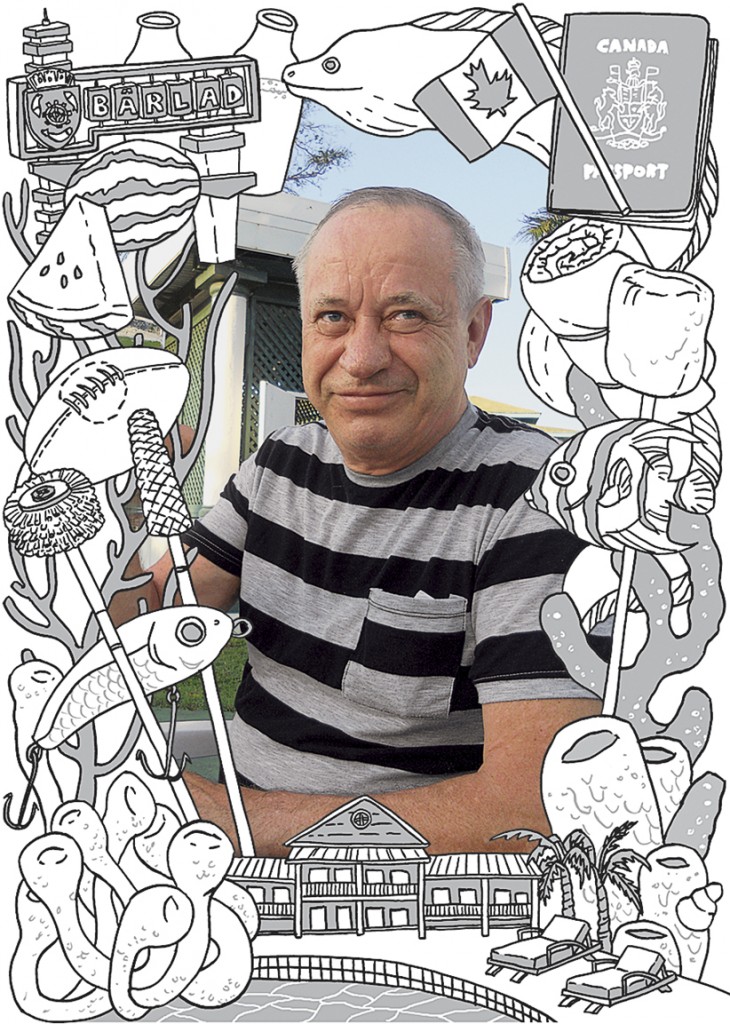Gigel Tonea, 1948-2014
He fled Romania in search of a better life in Canada. On trips to Cuba, he developed a love of underwater life.
Share
Gigel Tonea was born in Barlad, a small town in northeastern Romania, on March 26, 1948. His father, Ioan, was a mathematician who taught at the local elementary school, and his mother, Dumitra, worked as a seamstress in a factory.
An only child, Gigel had an adventurous spirit and enjoyed exploring the outdoors. He grew up on a farm and would wake up at 3 a.m. every morning to milk the cows and collect watermelons. In his spare time, he would hike through the mountains. He started playing rugby at age 16 and eventually earned a spot on the team at Carol Davila University in Bucharest. At the same time, he studied dentistry and found work as a dental technician at the university’s clinic.
He married his first wife in 1971, but they divorced seven years later. In 1980, he met his second wife, Anca. She was a dental assistant and they often worked together in the same lab. On their first date, Gigel took her to a party at a friend’s cottage. She was drawn to his passionate personality: “He wanted to be the best at everything and he was very energetic,” Anca says. “He always compared rugby to life, saying you have to fight against everybody, everywhere. But at the same time, he had a very gentle heart.” Anca had a son, Alex, from a previous marriage, whom Gigel raised as his own. In 1983, after one year of marriage, Anca gave birth to their son, Bogdan, on Gigel’s birthday.
In 1986, Gigel left Communist Romania in search of a better life for his family. After a year and a half in Greece, he applied to immigrate to Canada, arriving in 1988. Anca stayed behind in Bucharest with their children for five years. Their house was taken away, but she was able to keep her job. Anca and Gigel would write letters to each other and spoke on the phone as often as possible. In 1991, Anca and the boys finally made it to Canada. The parents found work at dental labs in Toronto and settled in; their daughter, Marie-Louise, was born in 1993. She inherited her father’s strong personality and Gigel was proud of her desire to pursue a career in medicine.
Gigel loved to go camping and fishing with his family and friends whenever he had the chance. After he started his own dental-technician business in 1997, the Toneas began saving up for annual family vacations. The first trip they took was to Cuba and Gigel was hooked. “He just fell in love with the place,” says Marie-Louise. “It was the people, the weather and the water that brought him back to Cuba again and again.” His goal was to visit as many of the island’s resorts as possible.
“He always had this thing with underwater life and its beauty,” Marie-Louise says. “I remember him snorkelling and scuba diving with the eels in Cuba; he really loved that part.” Because of their claustrophobia, Marie-Louise and her mother didn’t share his love for underwater activities and, from afar on dry land, would watch him, Alex and Bogdan.
Over the course of his many Cuban adventures, Gigel began to notice changes in the coral reef. Two years ago, he saw dead chunks of coral washed up on the beach and was concerned about the future of the sea life he had come to adore. “He would say we were at the end of an era and that we have to protect these species, that there might be nothing more to see in five years,” says Anca.
On May 20, Anca and Gigel set off on their annual holiday to Cuba—their 17th trip to the island—this time, to the Gran Club Santa Lucia resort. It was just the two of them, and they were looking forward to a romantic getaway. Gigel was also eager to get out and see the extent to which pollution had damaged the reef since his last trip. On May 22, he put on his snorkel and flippers and headed out into the sea.
From the beach, Anca saw a speedboat go by and suddenly stop right near where her husband was snorkelling. She saw a passenger on the boat lift a man wearing flippers out of the water and she knew something had gone wrong. After a few frantic hours spent trying to figure out what happened, a resort employee came to tell her that her husband was dead. She would later learn—only after returning home and having her children translate the Cuban police report—that the speedboat had run him over. Gigel died from injuries to his head and back. He was 66.
